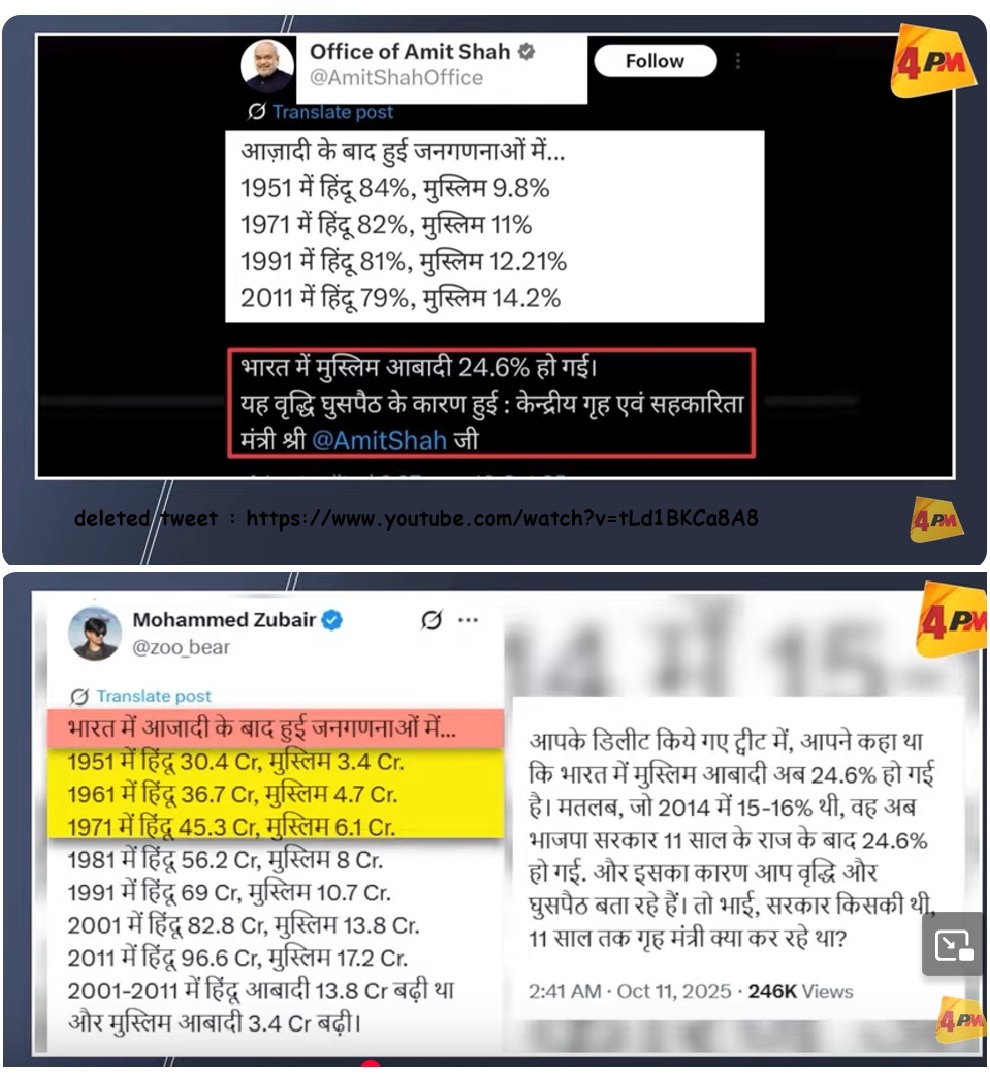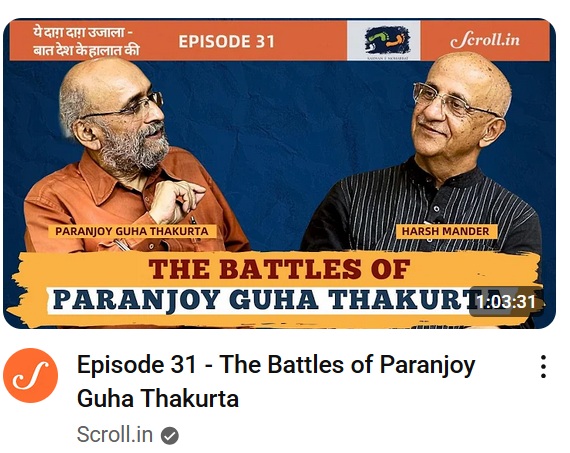शाह का झूठ पकड़ा गया, पोस्ट Deleted !! उलटे पांव भागे Amit Shah https://www.youtube.com/watch?v=tLd1BKCa8A8  In deleted tweet, Shah said that the Muslim population in India had grown to 24.6%. Meaning, the Muslim population, which was 15 to 16% in 2014, has now grown to 24.6% after 11 years of BJP rule. The reason for this is now being attributed to growth and infiltration. So, whose government was it? What was the Home Minister doing for 11 years? The Home Minister himself is citing the reason as the way infiltrators have entered India through infiltration, and the way Muslims from Myanmar and Bangladesh have entered India forcibly. All of this is under the Border Security Force's control. The BSF is under the Home Ministry
In deleted tweet, Shah said that the Muslim population in India had grown to 24.6%. Meaning, the Muslim population, which was 15 to 16% in 2014, has now grown to 24.6% after 11 years of BJP rule. The reason for this is now being attributed to growth and infiltration. So, whose government was it? What was the Home Minister doing for 11 years? The Home Minister himself is citing the reason as the way infiltrators have entered India through infiltration, and the way Muslims from Myanmar and Bangladesh have entered India forcibly. All of this is under the Border Security Force's control. The BSF is under the Home Ministry
https://www.youtube.com/watch?v=TIALS0v1A8w Hindu Population Growth 16.8%, Muslim Population Growth 24.6%: Amit Shah | Editorial with Sujit Nair . Mr. Nair opines that these statements made by HM Shah are nothing but a diversionary tactic from the caste conflicts that is taking place in the country after CJI B.R. Gavai was attacked by advocate Rakesh Kishore by a shoe and the civil unrest that is taking place in Ladakh after the arrest of climate activist Sonam Wangchuk under the stringent NSA.
Wintrack CEO Exclusive: Corruption Curbing Ease Of Doing Business? https://www.youtube.com/watch?v=3Ffhsk6SZDo Oct 3, 2025
Wintrack CEO Praveen Ganesan alleges he was forced to give bribes to clear goods at Chennai Customs. He claims ( in the video too, RS keeps repeated the word "claim" rather "insists" or just "say" that after exposing an issue in January, he continued to face harassment, culminating in a demand for five lakhs in May, of which three lakhs were paid. According to Ganesan, a subsequent shipment in June was held up because a department did not receive its share of the bribe money. Chennai Customs denies the allegations, stating the claims are a way to avoid scrutiny for the company's own violations.
https://www.youtube.com/watch?v=akDyB1OWZzw Wintrack vs 'Corrupt' Chennai Customs Explained: Govt Orders Probe After Cargo Company's Allegations
https://youtu.be/vWXaS7C-SRI?t=74 Oct 4, 2025 China’s semiconductor leap is shaking global markets as Huawei unveils its Ascend 910C processor, disrupting the long-standing dominance of U.S. chipmakers. The breakthrough comes alongside China’s progress in extreme ultraviolet lithography, a technology once monopolized by the West, signaling a major step toward technological independence. Despite early production challenges, China is compensating through scale and state-backed investment, fueling a rapid transformation in its computing, telecom, and consumer electronics industries.
The ripple effects are seen in shifting smartphone market shares, massive cloud infrastructure expansion, and surging investments from Chinese tech giants like Tencent, Alibaba, and Baidu. With new ecosystems emerging across semiconductors, 5G networks, and advanced devices, the global balance of technology leadership is undergoing a fundamental change. Western companies face mounting pressure as China’s parallel innovation system accelerates, reshaping industries from mobile devices to high-performance computing.
Bhagalpur Bihar की 1,050 एकड़ ज़मीन Adani Power Plant के लिए सिर्फ एक रुपए में लीज़ दी, BJP क्या बोली? https://www.youtube.com/watch?v=ShpynRFCTDw&list=PPSV Sep 16, 2025 Gautam Adani faces fresh allegations as Congress’s Pawan Khera claims the Adani Group got 1,050 acres in Bhagalpur for a 2,400 MW power plant at a token Rs 1 per year lease for 33 years, with “10 lakh” mango, litchi and teak trees on the land. BJP sources counter that the project followed due process and investment will boost Bihar’s power capacity under a 25-year PSA. What’s the truth on the lease terms, land use, and tariff to consumers?
A Cosmic Coincidence? https://indianexpress.com/article/opinion/columns/mahatma-gandhi-birth-anniversary-rss-centenary-m-k-gandhi-10283435/lite/
RSS and Gandhi share a birthday. In that irony, there is a call to move beyond violence — and seeing the ‘other’ in a new light Rajni Bakshi October 2, 2025
In an ironic twist, the Rashtriya Swayamsevak Sangh (RSS) will complete 100 years on Gandhi Jayanti. Even if the term “cosmic coincidence” appears misplaced here, this juxtaposition of birthdays calls for open-minded reflection, some “hatke” perspectives.
When the RSS was born, on Dussehra day in 1925, M K Gandhi was a major national leader. Over the next 28 years, while the RSS created a grassroots cadre to build the strength of Hindus, Gandhi applied his spiritual anchor as a Sanatani Hindu to address bitter socio-political conflicts through love and non-violence.
On January 30, 1948, Gandhi was murdered — for allegedly being anti-Hindu. The world mourned the passing of an inspirational colossus. By then, the RSS had grown roots; it was briefly banned for being one of the influences that led to Gandhi’s assassination. Almost eight decades later, on the face of it, the RSS is triumphant while Gandhi’s legacy is commonly seen as faded, tattered.
And yet, it is not quite “game over”. The concerns underlying Gandhi’s opposition to “Hindu” nationalism have become more urgent. Namely: What does it mean to be truly sabhya or civilised? In that context, what does it mean to be a Hindu or a Muslim, Christian or Sikh or Jew? Above all, how do each one of us relate to, or deal with, whoever we perceive to be the “other”? It would be presumptuous to assume that we can know what Gandhi would have done today. But the inspiration of the civilisational Gandhi does provide some cautionary road signs.
Lamentation in and of itself is unhelpful. The promotion of hatred needs to be creatively and constructively overcome. Hating the hater does not do that. Assigning responsibility for wrong-doing is vital. But this is different from either blame and shame or moral ambiguity. We need to stand firmly against the wrongdoing while fostering spaces for redemption of the wrong-doer.
Demonising the opponent is futile or even counter-productive. This undermines the possibility of tapping the forces of light within the wrong-doer — or at the very least trying to see where the wrong-doer is coming from. A politics that draws its energy from resentment inevitably feeds hatred and animosity.
These truths apply to every shade of ideology and political action. The physics of human behaviour does not operate differently whether you feel aligned to Gandhi or to his assassin. The RSS centenary year comes at a time when there is a pervasive feeling that reason and generosity in public discourse are a thing of the past. It is easy and lazy to put the blame for this situation entirely on the political and cultural movement that the RSS has nurtured, one that has been on a winning streak since the 1990s.
Most movements that have given primacy to their end goal rather than means, have tended to either actively use violence and hatred or make excuses for them. In this respect, the RSS is only part of a long, global historical trend.
What is new is the mass scale alienation and polarisation generated by digital platforms. This has spawned extremes of hate speech and hate crimes which now have a life of their own. It is unclear whether the formal structures of the RSS are unable or unwilling to check these forces. What is clear is that these energies are not a genie that could be put back in its bottle. These are political and psychological phenomena that can only be transformed and diffused through a mass renewal of samaj and its moral energy.
One obstacle to this is the acute polarisation over how the RSS is seen. For a large number of Indians, this organisation represents restoration of not just Hindu pride but Indian confidence. For an equally large number, it represents a politics of Hindu supremacy, with ill-treatment of Muslims and Christians becoming commonplace.
Both perceptions are factually correct and yet, the two opposing sides have something in common: The belief that conflict itself is unsolvable and thus permanent. For example, if you see Hindus as a beleaguered global minority under perpetual threat from Muslims and Christians, then it may be impossible to ever imagine a cessation of hostilities. If you treat all religion as regressive, then it is equally difficult to imagine a secular democratic society without a defeat of the religious amongst us.
Conflict is an inherent part of the human condition. But violence — that is, physical harm and indignity — is neither inevitable nor unavoidable.
There is a long history of tenacious conflicts between groups — over centuries. But there is also evidence of how human beings have peacefully resolved conflicts. This evidence shows some repeat patterns which are worth highlighting. One, disagreement may persist but dislike and mistrust can fade into insignificance. Two, because you no longer fear the “other”, neither the fear nor the “other” look like monsters. Three, this creates mental space to identify and understand the concern behind the complaint/anger of the opponent.
P B Mehta writes: The loneliness of Ram and Gandhi
I am painfully aware that all of this seems unhelpful to the person who is being attacked by a mob. Yet, listening closely to human rights workers on the ground sometimes reveals a glimmer of light. There are accounts of physically weak individuals spontaneously jumping into the fray to defend a person who is being beaten because of their caste or religion. There are reports of how people who seem to approve of violence when part of a crowd, behave differently when they are alone and engaged in conversation with a sympathetic listener.
This October 2, there may be many who will celebrate one birthday while treating the other as worthy of condemnation. But such a simplistic divide is both unfortunate and misleading. The future depends upon all those who are willing to at least know, if not embrace, the “otherness” of their other. By the way — “cosmic coincidence” is a legitimate term in cosmology, referring to chance events and unlikely phenomena. For instance, the Sun is about 400 times larger than the moon and 400 times farther away. It is this ratio which allows for a solar eclipse — making the moon appear to perfectly cover the Sun.
Bakshi is an author and the founder of the Youtube channel ‘Ahimsa Conversations’
https://www.tandfonline.com/doi/full/10.1080/03066150.2025.2537260 Accumulation in small-scale horticulture: entrepreneurial farming and the regional state in South India (Andhra Pradesh)
We have been encouraging people to make summaries or headline of important articles that they read, while forwarding links. We also encourage people to blog their summaries, so that these can be connected to other efforts, thinking etc.. Thanks Mani)
Shift from groundnut to horticulture : In Rayalaseema (esp. Anantapur), groundnut cultivation declined after the 1990s due to falling profitability. Farmers shifted toward high-value horticulture, particularly sweet orange, encouraged by state policy .
Role of the regional state: Since the early 2000s, successive Andhra Pradesh governments promoted horticulture as a solution to agrarian crisis through subsidies (micro-irrigation, sprayers), debt waivers, canal irrigation investments, and marketing reforms like rythu bazaars. The state actively created infrastructure for horticulture, rather than simply “rolling back” interventions .
Emergence of small-scale entrepreneurial farmers: Many small and OBC (Backward Caste) farmers took up sweet orange cultivation, cultivating entrepreneurial practices of self-governance, risk management, and market engagement. Farming became tied to ideas of talent and enterprise, reinforcing social status distinctions .
Patterns of accumulation and inequality: Horticulture allowed some small farmers to accumulate capital and avoid proletarianisation. However, gains were uneven: OBC farmers made modest upward mobility, Reddy caste farmers retained dominance, Scheduled Castes had negligible participation due to resource constraints, Reliance on groundwater made accumulation precarious .
Market structures: Instead of global corporate agribusiness, local and regional merchant networks dominated trade. Farmers often sold to “Sirivel Muslim” traders from Kurnool district, who extracted value through informal practices (e.g., taking 20% of fruit gratis). Farmers avoided APMC markets due to high costs and commissions .
Technological and labour change: Mechanisation, micro-irrigation, and input-intensive cultivation reduced demand for wage labour, especially women’s agricultural work. This contributed to declining female participation in farm labour .
Governance and neoliberalism: The study argues that horticulture in Andhra Pradesh reflects a neoliberal governmentality: the state promotes market-oriented farming and “self-help” discourse, while embedding new technologies and infrastructures that discipline farmers into entrepreneurial behaviour .
Broader implications Horticulture stabilises smallholder livelihoods in dry regions but intensifies ecological stress (groundwater depletion) and social differentiation. The agrarian question of accumulation remains central in India—not just labour. Regional states, not only national policy, are crucial drivers of agrarian transformation .
https://www.youtube.com/watch?v=WJt-NpgTCr8 Preparation To Destroy Democracy?':Anurag Thakur's Rebuttal To Rahul Gandhi's Voter Deletion Claims
https://www.youtube.com/shorts/bTaqwIzni6c @ms.medusssa BJP accepts #VoteChori ?
https://www.youtube.com/watch?v=QWwOiR9q2KA Is ECI Acting as a Constitutional Guardian or a Political Player? | Editorial with Sujit Nair Mr. Sujit Nair discusses the ‘vote chori’ row, in which the Leader of Opposition in the Lok Sabha alleges that vote theft occurred in recent elections. The Election Commission of India has consistently denied these claims. Meanwhile, the BJP has also entered the fray, alleging the presence of ‘doubtful voters’ in at least six Lok Sabha constituencies.
https://www.youtube.com/shorts/vWh6YIH3UiE | Is EC Treating BJP Differently Than Congress? | Rahul Gandhi | Anurag Thakur | Vote Chori
https://www.youtube.com/shorts/dhc-WB0pzWo Sr. Adv. Indira Jaisingh “majoritarian hindutva govt. wants its own people in judiciary”
- Gaza discord has Netanyahu scrambling ahead of DC meet, but Trump offers him way out
- C919 Grounded: EU Blocks Certification, US Laughs — China Strikes Back!
- Journalist Niranjan Takle on Justice Loya issue
- Ex-IAS Kannan Gopinathan exposes ECI's Voter Portals Vulnerabilities, Demands Urgent Fix
- The Legacy
- Navratri Diktat: 'Hindus Only' Entry
- Why non-profits require flexible, long-term funding ByDeval Sanghavi, Neelesh Hundekari
- Vote Deletion Rule changed after Rahul's expose
- On Public Private Partnership
- 5 Bad Decisions By Modi Government
- Impact of Demonetization and its Effects on Economy
- Behind the West’s rising dislike of Indian migrants
- Rahul Gandhi gets Support of Former CECs
- Is Modi’s Swadeshi Pushback Only a Rhetorical Shield?
- Govt Doesn't Know A-B-C Of Economics
- India’s Biggest Roadblock to Viksit Bharat
- Fraternity in a Secular State
- Mumbai Real Rstate Redevelopment: 44,000 Homes & 1.3 Lakh Crore Opportunity
- From Shadow Libraries to Citizen Science: Defending the Constitutional Duty of Inquiry
- Deteriorating Financial Situation of the People


